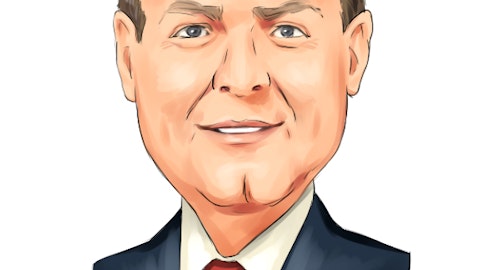Jeff Farber: So, Mike, we have a lot of confidence in the long-term trajectory and the drive over the period of time to the 14%-plus ROE. 2023 will be very solid results. And you’re right, if you were to do the math, think something like the guidance would imply 11.5% to 12% ROE, and that’s not where we wanted it to be, but it’s solid. But as you think about the rate and how it earns in and if we think about 2024, for 2024, we are every bit as strong as we would have anticipated in the Investor Day, if not stronger, when you bake in investment income. So, we’re still very, very optimistic about the trajectory. But clearly, 2022 and even into ’23, are not exactly on that line, but I think we’re perfectly fine with that.
Mike Zaremski: Any comments on just will the firm — the firm’s compensation structure given we’re 1.5 years in, does it reflect a step-up in ROE over time?
Jeff Farber: Well, remember that particularly for our senior executives, we’re heavily influenced in our compensation by long-term stock. So, I would argue that our performance, meeting expectations of investors is heavily weighted in our compensation scheme. But I think our Compensation and Human Capital Committee regularly intersects with our — with the management team to set appropriately aggressive goals and to adjust those as the environment starts to improve, and we have high expectations that we’re going to achieve those longer-term targets like we said, and our goals will reflect that.
Mike Zaremski: Okay. Understood. And maybe I’ll sneak one last one in. Just in terms of kind of reappraising property values to reflect inflation over the last couple of years, is there — I don’t know if it’s baseball inning analogy in terms of kind of reunderwriting on the property side of the portfolio, maybe on the commercial side that you could kind of give us some insights into? Is it kind of latter half baseball innings or still a lot of work to do there? Thanks.
Jack Roche: Well, I’ll just say a quick thing about this. This is Jack, and then maybe let Dick get his perspective on the table. But I would say we’re pretty far along in our overall property re-underwriting and repricing, but the environment is dynamic. And if we’ve learned one thing over the last few years, including the pandemic implications as well as the inflationary and supply chain pressures, some of the weather dynamics going on is that our job is never done in terms of assessing those trends against our portfolio and making sure that our underwriting and our pricing reflects those changes. So, I’m confident that we know how to do that and that we’re making all the right adjustments. But I think because of the dynamics, Mike, it’s hard to say what inning in the game is. I think the game continues, and it may be more like a soccer match where you have to just keep going until the PKs are done. But Dick, do you want to build on that?
Dick Lavey: No, exactly. I would say we’re leaning into the ITV increases throughout this entire next year, and we’ll watch it closely, right, both on the building values, the contents, business income. So, we’ve meaningfully increased what sort of rolls on to each policy upon renewal. And so, we’ll see that — we’re just going to continue to put that at a pretty high level and watch the actual loss cost. But then also, as Jack said, we took a hard look at where within our book, we might be — there might be undervalued properties. And so, you get at that in sort of a one-time basis where you analyze where ITV may fall short and you make adjustments. So, we’re pretty far along on that process. And just — this is one that will be in front of us absolutely for the next 18 to 24 months.
Mike Zaremski: Thank you for the insights.
Jack Roche: Thank you, Mike.




